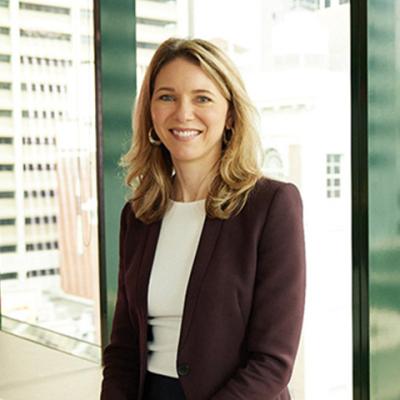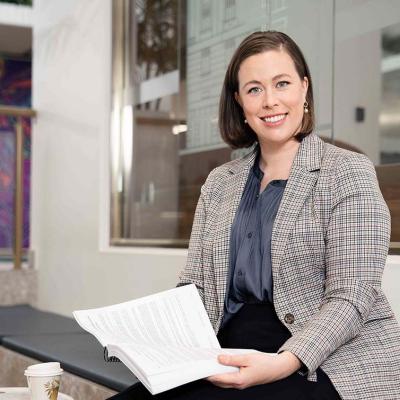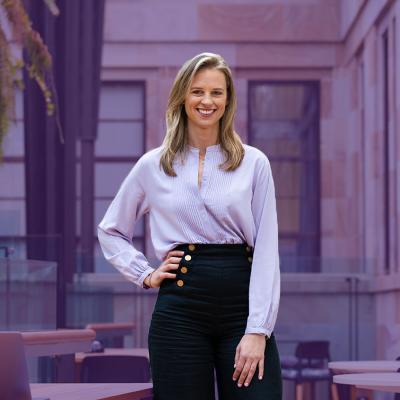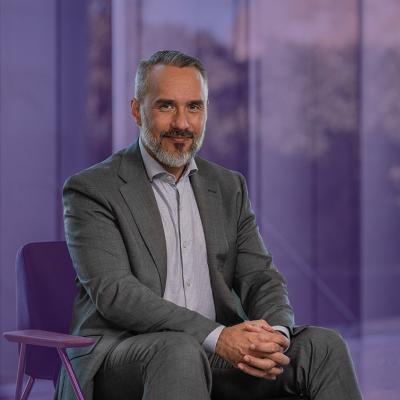Camilla Roberts’ career has been driven by her desire to make a difference. As a global marketing manager, she worked with chef Jamie Oliver in London to address childhood obesity. She then returned to Australia to work at one of the few ASX 200 companies with no women as executives or board members.
A lot happened while Camilla was studying the UQ Master of Business Administration (MBA).
Initially, her company provided financial support for her studies. But after some flooding, that company made 50% of their head office redundant. This led Camilla to start her own freelance consultancy. She also took on a board director role and became pregnant with her first child.
Now, Camilla is the founder and CEO of Scale Impact, which helps innovative companies scale their impact through non-dilutive funding services.
Here's how Camilla juggled competing priorities to graduate with the skills and confidence to pursue a rewarding career that makes a difference.
Learning to run a business and eradicate blind spots
Despite her strong background in specialist marketing, Camilla felt she was being held back by not having a holistic understanding of business. She primarily joined the UQ MBA to improve her leadership skills and gain the knowledge needed to succeed in business.
“I wanted to understand how businesses can accelerate with the help of investors but retain their value and purpose,” she says.
“To do that, I needed to understand how businesses work and how they’re structured.”
“It's so good to learn all the different skills and subject areas of business. It’s like learning all the departments in an organisation, which means you don’t have any blind spots. This is really important when you get into a meeting room, because you understand everyone’s perspective and their value.”
“It also helps you prioritise what matters in the business and understand your role in making change occur,” says Camilla.
“This increases your effectiveness and makes you more valuable, and that gives you confidence.”
“Having confidence means you’re more willing to take risks and propose new ideas, because you trust yourself. You’re also less concerned about other people’s reactions to your suggestions.”
Camilla's MBA didn’t just boost her confidence at work. It also proved beneficial in her role as a non-executive director for a not-for-profit organisation based in Melbourne.
“I learned that profit is so important to sustainability and scaling impact, even in the not-for-profit space,” she says.
“You can’t have maximum impact if you don’t know how to run a business or not-for-profit well.
“Realising this led to a real mindset shift. I had previous experience working in the not-for-profit space, where profit can be considered a negative term. But if you’re reinvesting profit to have an impact or to make an organisation more sustainable so it can have that positive impact for the long term, profit suddenly becomes a positive word in the not-for-profit context.”
A tailored learning experience
Camilla knew she wanted to accelerate and scale the impact of companies with social, economic and environmental benefit, so she focused her studies on startups, high-growth innovation businesses, and venture capital.
This is ultimately why she founded her company, Scale Impact, where she continues to apply what she learned in the MBA to her work.
“I loved tailoring what I learned in the subjects to my interests and passions,” says Camilla.
“I used the assessments and courses for my work and focused on sustainability startups, which helped me develop a speciality.
“For example, I had to do an assignment for the operations class, and I wanted to do it on scale-ups and accelerators. That’s not traditional for an operations subject, where you typically think about manufacturing and construction theory.
“But with my lecturer's support, I applied operations theory to the high-reward, high-risk world of venture capital startups. It was a really valuable experience.”
“I still use this assignment in my work today. It helps me find good companies to work with, which is hard in the startup venture capital world. Even last week, I was trying to work out the time value of money for a negotiation. I was able to refer back to another old assignment where I’d done the deep thinking before and applied the insights to this new situation.”
How Camilla made the MBA’s flexibility work for her
Fitting study into a busy life is always challenging. Camilla already had plenty going on when she started her MBA, but she was confident she could make it work – and that it would be worth it.
“I was in a full-time, busy corporate job where I was often travelling,” she says.
“Then, when I was made redundant, I had to create my own work, so I started my own consulting firm while searching for another full-time job. At the same time, I held a non-executive director position on a not-for-profit board. I was also planning to have children and juggling other general life commitments.”
“To cope, I took advantage of all the flexibility options available in the MBA. I tried studying full-time by attending morning and evening classes while working full-time, and then I did some intensive courses.”
“I had to get really good at scheduling and working out what was most important during this time,” says Camilla.
“But learning how to be the most efficient with limited time really stood me in good stead beyond the MBA.”
Camilla also became pregnant with her first child towards the end of her degree. When she realised her due date lined up with her final finance exam, Camilla knew she needed to ask for help.
“It’s very hard to predict how you’ll feel physically and mentally after having a baby,” she says.
“I discussed my concerns with the MBA Director, and we found a solution that allowed me to take the exam early due to my circumstances. I ended up getting a good mark for that subject, and the baby was fine as well!”
Learn more about the flexibly study options available to you as an MBA student.
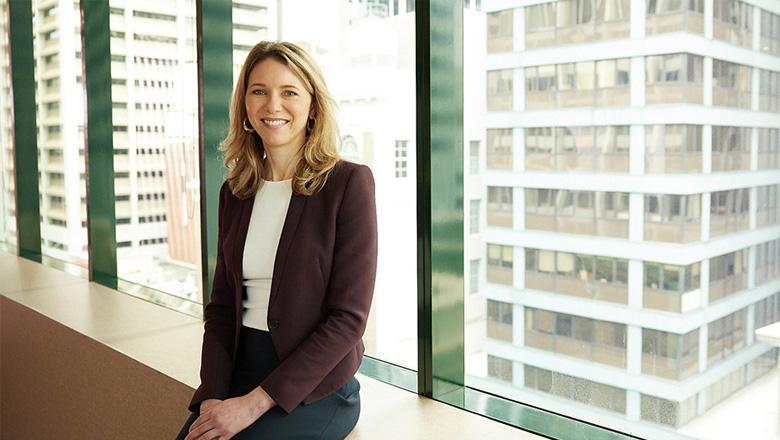
From Harvard to career mentors: creating connections for life
Camilla chose UQ for her MBA because she wanted to make valuable connections.
“It can be difficult at work to create friendships, find support from senior colleagues and be open about your personal life,” she says.
“That’s why the MBA network is so great – you can be honest and really unlock what’s important to you and access support to achieve it.”
“Who you study with is really important. The network of connections I made while studying is still in my corner today.”
Studying at UQ also gives you access to the MBA Careers and Professional Development Team, which connects students with contacts to foster personal and professional opportunities. Camilla used this support and connected with people who had achieved success in scale-ups and venture capital.
“They introduced me to two gold-standard people who were very generous with their time and met me for coffee,” she says.
“I’m still in contact with them now, but I wouldn’t have had that introduction without UQ.”
In the MBA, students can expand their network globally as well, by studying at an international partner institute. Camilla chose to go on an exchange to Harvard and took this opportunity to get in contact with like-minded contacts in America.
“I was really lucky to meet a particularly fantastic set of students on the Harvard Exchange, and now we’re each other’s cheer squad back in Australia,” she says.
“They’re from different career paths and all incredibly successful, amazing minds.
“When we were at Harvard it was the 4th of July and we decided we wanted to learn how to sail. We went to the sailing club by the park where the Boston Pop Orchestra played. There, we sat in boats, toasting, with fireworks going off around us.”
“That’s the kind of magic that you wouldn’t expect from an MBA, but it was because of the UQ MBA that we were all there.”
“Other connections I met while studying impacted my career, but not in the way I thought,” says Camilla.
“I wanted to know if it was possible to have a family and be excellent at the work I’m passionate about, without feeling like I’m letting anyone down.
“Through the MBA, I was fortunate enough to meet women who had already forged that path. They were great examples, and I was able to mine them for tips, which opened up everything for me.
“I didn’t feel like I had to constrain my ambition or interest. I could see it was possible to find a way to make things work.”
The MBA is a transformative experience
Camilla joined the MBA program to learn about business, and she believes that the UQ MBA has had a significant impact on her career. But she finds it challenging to quantify the exact extent of this influence.
“One thing that surprised me about the MBA was how much you begin to enjoy it,” she says.
“When most MBA students start, they worry about the workload and try to find ways to finish the program quickly.”
“But once you get into it, you enjoy it so much. You start meeting so many people and apply your own personal ambitions to the assignments, and suddenly your mindset changes. You start wondering how you can keep this new community around you, because it’s helping so much.”
“During the MBA, I realised having a positive impact that’s really scalable is very important to me,” says Camilla.
“Now, I’m less focused on the subject matter of the work I do and more focused on finding opportunities for positive impact and scaling them.
“At the moment, that’s mainly in the sustainability space in agrifood. But if I see an interesting, innovative company that wants to have a global impact, I want to help them.
“It’s not a traditional 9-to-5 corporate role. But it’s very fulfilling and exciting.”


